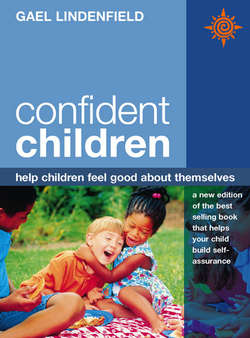Читать книгу Confident Children: Help children feel good about themselves - Gael Lindenfield, Gael Lindenfield - Страница 20
What is super confidence?
ОглавлениеThis is the term I use to describe the kind of confidence which is constructed from all the above components and, as I said earlier, has some indefinable ‘extra’ quality. The additional strength and power of Super Confidence derives from the continual supportive interaction between its inner and outer parts.
This is the kind of confidence which the idealist in me would love all children to have developed before they leave the protection of the nest. The realist in me knows, however, that the goal for most parents must be to give their children a ‘good-enough’ measure of both inner and outer confidence – plus, very importantly, the belief that they
Give your children a ‘good-enough’ measureof both inner and outer confidence
themselves can build on these foundations and eventually acquire the ‘super’ version for themselves in their adult life.
When as parents we are trying to lay down the foundations of confidence for our children, I think it is important to remember that we need to achieve a good balance between the inner and outer elements. Very often certain parts get developed at the expense of others. Unfortunately, in many ambitious families and schools, for example, too much emphasis may be put on the outer confidence skills. I recently read with interest that Joe Kennedy, the father of the late American president John F. Kennedy, would say to his children:
‘It’s not what you are that counts,
it’s what people think you are.’
Perhaps this kind of philosophy was in part responsible for his sons’ problems in finding personal peace, in spite of their considerable skills in the area of outer confidence. I have met very many outwardly successful people who have also learned to behave in such a cool, controlled manner that you would find it hard to believe that they are secretly wasting a lot of precious time and energy worrying about whether they will be liked or loved, whether they will be able to ‘do it’ or ‘say it’, wondering whether they have made ‘the perfect decision’ or kicking themselves for having hurt the feelings of an aggressive bully.
In contrast, there are also children who may be full of inner confidence but fail to communicate their strengths to the rest of the world. Others may never know how clear and strong the beliefs and ideas of such people actually are, because they are rarely proffered, and these people may never be given the ‘plum opportunities’ which they know they deserve, simply because their presence is hardly noticed. And, because they have never learned how to make the best use of their inner confidence, they continually under-achieve and may subsequently become bored, disheartened and depressed.
‘I went to parents’ evening last week and was shocked to hear what the class teacher said. She wondered whether someone at home was helping Peter with his Maths homework. She said she found it difficult to believe that he could produce such a high standard of written work when in class he never seemed to know any of the answers when he was asked.
‘I was shocked because firstly, we would never actually “do” his homework for him and, secondly, we don’t need to. He usually finds it too easy – in fact he’s probably better than me at Maths now. He knows he’s really good and is already far ahead of his brother who is in the year above him. When I asked him why he doesn’t speak up in class when he knows the answer he says he can’t be bothered. I know he finds the lessons boring and says he doesn’t like Maths anyway now. It seems such a pity because that has always been his strong area.
‘He’s always been a shy boy – though not at home or with his friends. He clams up if you take him out anywhere where adults are. He’s like a different boy.’
